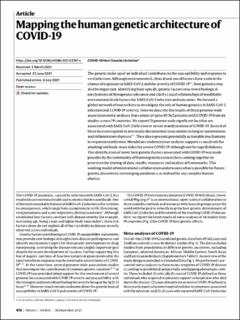| dc.contributor.author | Niemi, Mari E.K. | |
| dc.contributor.author | Karjalainen, Juha | |
| dc.contributor.author | Liao, Rachel G. | |
| dc.contributor.author | Neale, Benjamin M. | |
| dc.contributor.author | Daly, Mark | |
| dc.contributor.author | Ganna, Andrea | |
| dc.contributor.author | Pathak, Gita A. | |
| dc.contributor.author | Andrews, Shea J. | |
| dc.contributor.author | Kanai, Masahiro | |
| dc.contributor.author | Veerapen, Kumar | |
| dc.contributor.author | Fernandez-Cadenas, Israel | |
| dc.contributor.author | Schulte, Eva C. | |
| dc.contributor.author | Striano, Pasquale | |
| dc.contributor.author | Afset, Jan Egil | |
| dc.contributor.author | Solligård, Erik | |
| dc.contributor.author | Damås, Jan Kristian | |
| dc.contributor.author | Risnes, Kari | |
| dc.contributor.author | Bettini, Laura Rachele | |
| dc.contributor.author | Gustad, Lise Tuset | |
| dc.contributor.author | Holter, Jan Cato | |
| dc.contributor.author | Hov, Johannes Espolin Roksund | |
| dc.contributor.author | Karlsen, Tom Hemming | |
| dc.contributor.author | Folseraas, Trine | |
| dc.contributor.author | Holten, Aleksander Rygh | |
| dc.contributor.author | Dyrhol-Riise, Anne Ma | |
| dc.contributor.author | Tonby, Kristian | |
| dc.contributor.author | Lind, Andreas | |
| dc.contributor.author | Müller, Fredrik | |
| dc.contributor.author | Dudman, Susanne Gjeruldsen | |
| dc.contributor.author | Grimsrud, Marit Mæhle | |
| dc.contributor.author | Vadla, May Sissel | |
| dc.contributor.author | Myhre, Ronny | |
| dc.contributor.author | Kildal, Anders Benjamin | |
| dc.contributor.author | Hoff, Dag Arne Lihaug | |
| dc.contributor.author | Muller, Karl Erik | |
| dc.contributor.author | Heggelund, Lars | |
| dc.contributor.author | Bergan, Jonas | |
| dc.contributor.author | Skogen, Vegard | |
| dc.date.accessioned | 2022-01-31T09:26:58Z | |
| dc.date.available | 2022-01-31T09:26:58Z | |
| dc.date.created | 2021-12-22T13:56:11Z | |
| dc.date.issued | 2021 | |
| dc.identifier.issn | 0028-0836 | |
| dc.identifier.uri | https://hdl.handle.net/11250/2975857 | |
| dc.description.abstract | The genetic make-up of an individual contributes to the susceptibility and response to viral infection. Although environmental, clinical and social factors have a role in the chance of exposure to SARS-CoV-2 and the severity of COVID-191,2, host genetics may also be important. Identifying host-specific genetic factors may reveal biological mechanisms of therapeutic relevance and clarify causal relationships of modifiable environmental risk factors for SARS-CoV-2 infection and outcomes. We formed a global network of researchers to investigate the role of human genetics in SARS-CoV-2 infection and COVID-19 severity. Here we describe the results of three genome-wide association meta-analyses that consist of up to 49,562 patients with COVID-19 from 46 studies across 19 countries. We report 13 genome-wide significant loci that are associated with SARS-CoV-2 infection or severe manifestations of COVID-19. Several of these loci correspond to previously documented associations to lung or autoimmune and inflammatory diseases3,4,5,6,7. They also represent potentially actionable mechanisms in response to infection. Mendelian randomization analyses support a causal role for smoking and body-mass index for severe COVID-19 although not for type II diabetes. The identification of novel host genetic factors associated with COVID-19 was made possible by the community of human genetics researchers coming together to prioritize the sharing of data, results, resources and analytical frameworks. This working model of international collaboration underscores what is possible for future genetic discoveries in emerging pandemics, or indeed for any complex human disease. | |
| dc.language.iso | eng | |
| dc.title | Mapping the human genetic architecture of COVID-19 | |
| dc.type | Peer reviewed | |
| dc.type | Journal article | |
| dc.description.version | publishedVersion | |
| dc.source.journal | Nature | |
| dc.identifier.doi | 10.1038/s41586-021-03767-x | |
| dc.identifier.cristin | 1971500 | |
| cristin.ispublished | true | |
| cristin.fulltext | original | |
| cristin.qualitycode | 2 | |
